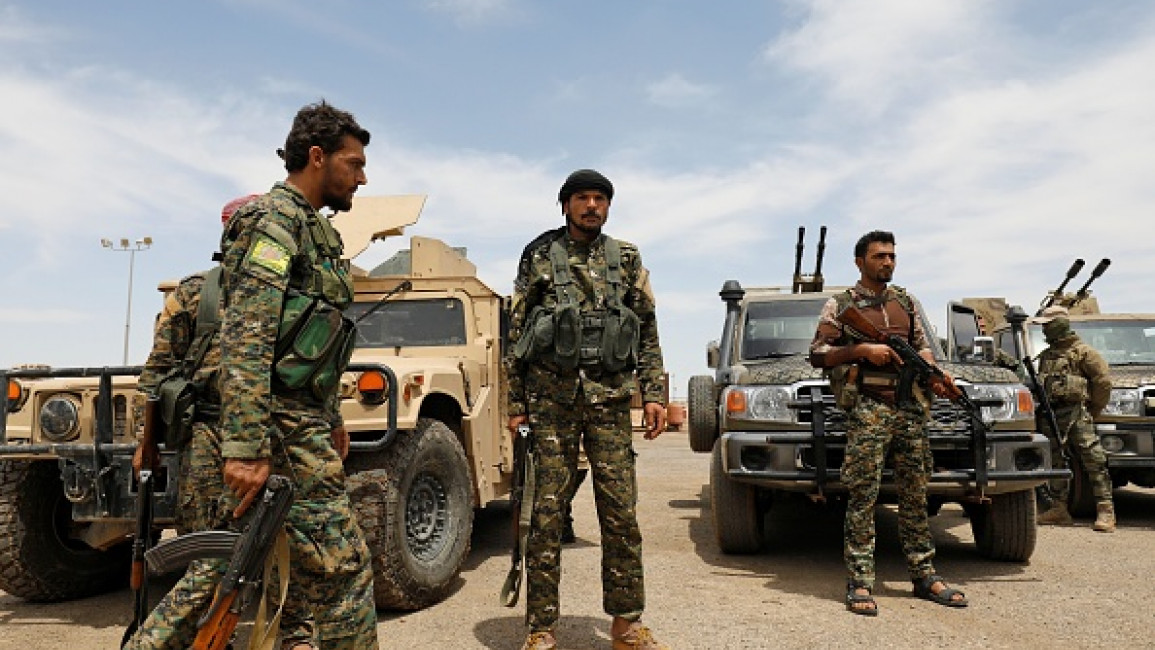Syrian-Kurdish forces storm prison where IS militants hold nearly 850 children hostage
The Kurdish-led Syrian Democratic Forces (SDF) have stormed a prison in Hasakeh province in northeast Syria, where Islamic State group militants have taken nearly 850 children hostage, the latest stage of a five-day-long prison break attempt by the extremists.
Rights groups warned that the children, some as young as 12-years-old, were at "serious risk" of harm and called on the SDF to exercise the utmost care in trying to rescue them.
An SDF spokesperson told The New Arab: "Full control of the situation is just around the corner."
They added that the "terrorists are still taking [minors] as human shields, but our anti-terror forces are trained and capable of dealing with the situation".
IS fighters attacked the Ghwayran prison late on Thursday in a coordinated assault, with fighters detonating car bombs near prison walls and prisoners attacking guards.
The group has since occupied the north wing of the jail and taken prison staff and children hostage.
In the surrounding city, IS fighters who escaped the prison have reportedly hidden in homes.
SDF and IS engaged in firefights throughout the weekends.
The US-led International Coalition Defeat Daesh also conducted airstrikes on the prison and shot from helicopters in an effort to dislodge the prisoners on Sunday. Authorities imposed a curfew on the local area.
The attack is the most high-profile, high casualty operation carried out by IS in Syria and Iraq since the SDF and International Coalition routed the last remains of the IS "caliphate" in March 2019.
The Syrian Observatory for Human Rights (SOHR) reported that at least 154 people have been killed in the last five days, though SDF sources allege the death toll is lower. A wave of displacement was also triggered by the fighting, with over 6,000 people fleeing the areas surrounding the prison according to the UN.
The SDF houses thousands of alleged former IS fighters in camps and prisons across the swathes of northeast Syria it controls. Many of the detention centres are makeshift, converted from old warehouses and schools. Prison riots happen sporadically, with prisoners complaining of poor conditions and a lack of clarity over when they will be released, if ever.
The Syrian Democratic Council (SDC), the political wing of the SDF, accused foreign countries of "abandoning their responsibility" in dealing with the IS fighters held in northeast Syria. It also claimed that Turkey was helping foment IS activity in the area, and that it was "obvious that the operation to target" the prison was planned in Turkish-occupied territories.
Turkey has denied any link to IS and fought a campaign against the group since 2016.
Since 2019, the Kurdish-led force has been housing about 3,000 foreign fighters held in northeast Syria, in addition to about 9,000 Syrian and Iraqi alleged fighters.
With few exceptions, foreign countries have dragged their feet in repatriating their nationals, despite calls by the SDF and aid groups for the international community to assist.
IS has generally carried out low-tempo, guerilla-style attacks in Syria over the last three years. The group mainly focused its efforts on Syrian regime soldiers and infrastructure in the Syrian central desert, where IS weapon stashes are located and the terrain makes hit-and-run style attacks easier.
Thursday’s attack was seen by many analysts as a break from the prevailing tactics, and as a warning sign that IS has grown in strength since its supposed death knell in 2019.
"The past nine days have seen an increase in IS attacks in both [Iraq and Syria]. These attacks and several before in the past few months… are bigger in the number of fighters and they are not carried out anymore in rural desert areas, but in city centres and against army posts," Suhail Al-Ghazi, a Syrian researcher with the Centre for Middle Eastern Studies (ORSAM), told The New Arab.
Bazad Amou, a local media activist living in the Jazira region of northeast Syria, said: "Detention of the most prominent leaders of the organizations in the prisons of the Autonomous Administration of North and East Syria [AANES] prompted [IS] cells to try to smuggle the organisation's members and leaders from prisons."
He added that "the issue of IS" is not just the SDF’s responsibility, but is rather that of the international community.
"The region must not be left to suffer the danger of IS’s return alone," Amou said.


![Minnesota Tim Walz is working to court Muslim voters. [Getty]](/sites/default/files/styles/image_684x385/public/2169747529.jpeg?h=a5f2f23a&itok=b63Wif2V)




![Debris near Rafic Hariri International Airport [Getty]](/sites/default/files/styles/image_330x185/public/2176162423.jpeg?h=a5f2f23a&itok=MCSK9mkM)
![An Israeli air strike on Jabalia killed teenage journalist Hassan Hamad [Screengrab/X]](/sites/default/files/styles/image_330x185/public/2024-10/hassan%20hamad1.jpg?h=c12e0b96&itok=Rd_dyCVp)
